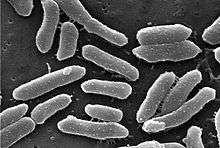Providencia (bacterium)
Providencia is genus of Gram-negative, motile bacteria of the family Morganellaceae. It was named after Providence, Rhode Island, where C. A. Stuart and colleagues studied these bacteria at Brown University.[2]
| Providencia | |
|---|---|
 | |
| Providencia alcalifaciens | |
| Scientific classification | |
| Kingdom: | |
| Phylum: | |
| Class: | |
| Order: | |
| Family: | |
| Genus: | Providencia Ewing 1962 |
| Species | |
|
P. stuartii | |
Providencia pathogens of humans
Some species are opportunistic pathogens in humans. Providencia stuartii can cause urinary tract infections, particularly in patients with long-term indwelling urinary catheters or extensive severe burns.[3] Alternatively, Providencia rettgeri is a common cause of traveller's diarrhoea.[4]
Providencia pathogens in insects
Many strains have been isolated from the haemolymph of Drosophila melanogaster fruit flies. These strains display different levels of virulence. For example Providencia sneebia is highly virulent, and infection always results in fly mortality.[5] Alternatively, P. rettgeri displays an intermediate virulence wherein some individuals survive infection, while others perish. The susceptibility to P. rettgeri is strongly tied to an allele of the antimicrobial peptide gene Diptericin.[6] Surprisingly, the fly's defence against P. rettgeri seems to rely almost exclusively on Diptericin, as deletion of Diptericin leads to complete mortality. Meanwhile deletion of multiple other antimicrobial peptides has no effect on P. rettgeri virulence. Yet defence against P. burhodogranariea is determined by multiple antimicrobial peptides beyond just Diptericin.[7] Why Diptericin is so specifically important in defence against one species of Providencia is not clear, but could yield insight into how bacterial species evolve resistance or susceptibility to antimicrobial compounds.
Trivia
- Providencia burhodogranariea is named after the "big red barn" in which conversations were held around its discovery.[8]
- Some strains are sensitive to ampicillin.
References
- Adeolu, M.; et al. (2016). "Genome based phylogeny and taxonomy of the 'Enterobacteriales': proposal for Enterobacterales ord. nov. divided into the families Enterobacteriaceae, Erwiniaceae fam. nov., Pectobacteriaceae fam. nov., Yersiniaceae fam. nov., Hafniaceae fam. nov., Morganellaceae fam. nov., and Budviciaceae fam. nov". Int. J. Syst. Evol. Microbiol.
- Stuart, CA; Wheeler, KM; Rustigian, R; Zimmerman, A (February 1943). "Biochemical and Antigenic Relationships of the Paracolon Bacteria". Journal of Bacteriology. 45 (2): 101–19. doi:10.1128/jb.45.2.101-119.1943. PMC 373720. PMID 16560614.
- Ryan KJ; Ray CG (editors) (2004). Sherris Medical Microbiology (4th ed.). McGraw Hill. ISBN 0-8385-8529-9.CS1 maint: extra text: authors list (link)
- Yoh, M.; Matsuyama, J.; Ohnishi, M.; Takagi, K.; Miyagi, H.; Mori, K.; Park, K. S.; Ono, T.; Honda, T. (2005). "Importance of Providencia species as a major cause of travellers' diarrhoea". Journal of Medical Microbiology. 54 (11): 1077–1082. doi:10.1099/jmm.0.45846-0. PMID 16192440.
- Juneja, P.; Lazzaro, B. P. (2009). "Providencia sneebia sp. nov. and Providencia burhodogranariea sp. nov., isolated from wild Drosophila melanogaster". International Journal of Systematic and Evolutionary Microbiology. 59 (Pt 5): 1108–11. doi:10.1099/ijs.0.000117-0. PMID 19406801.
- Unckless RL, Howick VM, Lazzaro BP (January 2016). "Convergent Balancing Selection on an Antimicrobial Peptide in Drosophila". Current Biology. 26 (2): 257–262. doi:10.1016/j.cub.2015.11.063. PMC 4729654. PMID 26776733.
- Hanson, Mark Austin; Dostálová, Anna; Ceroni, Camilla; Poidevin, Mickael; Kondo, Shu; Lemaitre, Bruno (2019). "Synergy and remarkable specificity of antimicrobial peptides in vivo using a systematic knockout approach". eLife. 8. doi:10.7554/eLife.44341. PMC 6398976. PMID 30803481.
- Juneja, P.; Lazzaro, B. P. (2009). "Providencia sneebia sp. nov. and Providencia burhodogranariea sp. nov., isolated from wild Drosophila melanogaster". International Journal of Systematic and Evolutionary Microbiology. 59 (Pt 5): 1108–11. doi:10.1099/ijs.0.000117-0. PMID 19406801.